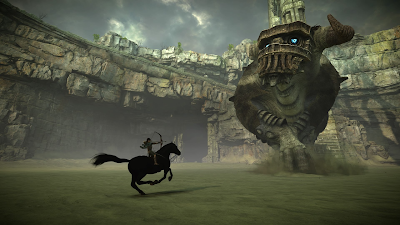Spoiler Warning: If you have not played Shadow of the Colossus and intend to play it, note that there will be spoilers as I will describe the events that take place at the end of the game.
I'm sure the title of this post will raise quite a few eyebrows for several reasons. Some literary scholars argue that post-modernism doesn't really exist and that we are still within the scope of the modernist movement today, or that we have entered into a movement that cannot yet be labeled. I am not yet certain where my own beliefs lie in this subject, but I have noticed many similarities between the structure of the cult PlayStation game "Shadow of the Colossus" and the commonly agreed upon definition of post-modernism. This is what I will be analyzing in my post.
A definition of post-modernism is given in the Norton Anthology: Postmodern American Poetry. The introduction to the anthology states that post-modernism "Suggests an experimental approach to composition, as well as a worldview that sets itself apart from mainstream culture and the narcissism, sentimentality, and self-expressiveness of its life in writing. Postmodernist poetry is the avant-garde poetry of our time" (Postmodern American Poetry xxv). The author then states that he could also have titled this anthology as "experimental" or "avant-garde" poetry, as those terms are similar in concept to "post-modernism".
I feel that this definition very neatly describes the story and concepts given to us in the video game "Shadow of the Colossus". The game begins with a simple story. A boy has brought a female companion to a shrine that he had to travel many miles to reach. The girl appears to be dead, or in a very deep coma. In this shrine, he learns from a disembodied voice that if he defeats 16 colossi, he will be rewarded in some way. With the boy, we hope that the reward will be a gift of life and health to the girl so that the boy and girl can live happily ever after. If this were a traditional story (pre-modern, we could say), the task would be simple: the boy would defeat the colossi and he would win the girl. Happy endings and celebrations would ensue. This is not the case with our hero, however. Fighting in an existentialist world, the boy (often known as the wanderer) defeats each of the colossi, which causes each of the individual statues in the shrine that represent the colossi to break. Each time the boy defeats a colossus, he is filled with a dark cloud that seems to cause him pain, but he fights on to save his female companion. To a casual observer who is not closely following the story, this might seem like a simple tale of chivalry. A closer interpretation of the events that are taking place, however, would set a player into an uneasy state -- it doesn't seem right for the boy to be killing these colossi. Many of them are docile and do not seem to be causing any harm to anyone, and what is going on with that black cloud that continuously attacks our hero? At the end of the story we learn the horrible truth. These colossi were benevolent guardians of the land, and the boy has destroyed them and thus has led evil into the valley. The boy's wish is granted, but at a terrible price -- the girl awakens to find that her hero has now become... a baby? The ending is rather confusing. Our last glimpse of our main characters shows the previously comatose girl caring for our infant hero.
As a work of post-modernism, we can understand that the storyline of this game fights traditional expectations of both literature and traditional game plots. The hero does rescue the girl, but the ending is not a happy one. Instead, like many works of post-modern literature, we are left confused. The world in which this story takes place is not an optimistic one. There is constantly a feeling of imminent failure and doubt. Am I, playing as the hero, doing the right thing? Is there any way to reverse the horrible actions I have taken? Now that I realize that killing the colossi is an act of evil, can I redeem myself? The ultimate answer is no: the only course of action that he can take is to continue his path of destruction with the tiny glimmer of hope that he will still be able to revive his companion. This complex concept can easily qualify "Shadow of the Colossus" as a work of literature worthy of analysis.
Another idea I would like to note here is that the story seems to heavily reference a scene from the ancient text The Epic of Gilgamesh. Though this subject does not necessarily add to the conversation about post-modernism it is interesting to point out as an argument for "Shadow of the Colossus"'s literary merit. The scene is described in the Norton Critical edition as follows:
The adventurers begin to harvest timber and are encouraged by the Sun-god to attack the guardian of the forest before he can prepare himself. As battle is joined, Huwawa [the guardian] issues a threat to Gilgamesh and Enkidu but is unable to carry it out. . . . When the monster begs for mercy, Enkidu dissuades Gilgamesh from granting it. (Gilgamesh 160)In this scene, Gilgamesh is instructed by a deity (similar to the disembodied voice that instructs the wanderer) to destroy the guardian of the forest, Huwawa. Huwawa has done nothing wrong -- he is merely guarding the trees in the forest from harm, much like the colossi guard the land in "Shadow of the Colossus". It takes two men with axes and the help of a god to bring the so-called "monster" down, but in the end Huwawa is defeated. This concept is similar to the one hero in "Shadow of the Colossus" who defeats monsters who are many times larger than he is, with the urging of some sort of spirit or deity.
I will end this with a few relevant comments about my personal "Shadow of the Colossus" experience:
- I have not yet played Ico. I know -- boooo!
- I have only completed the Playstation 2 version of SotC, and though I have played much of the PS3 remake, I have not finished it.
Works Consulted:
Hoover, Paul, ed. Postmodern American Poetry: A Norton Anthology. New York: W.W. Norton &
Company, Inc., 1994. Print.
Shadow of the Colossus. Dir. Fumito Ueda. Sony Computer Entertainment, 2005. Video Game.
The Epic of Gilgamesh. Trans. Benjamin R. Foster. New York: W.W. Norton & Company, Inc., 2001.
Print.
Edited on 3/13/2020 to include a screenshot from the SotC remake.









